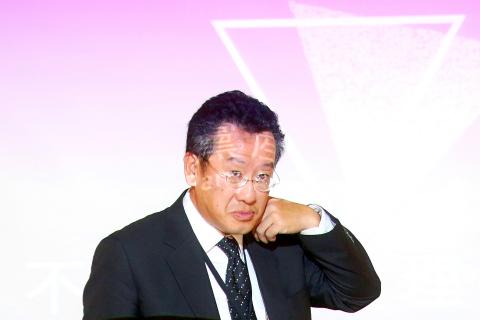The Chinese Nationalist Party’s (KMT) ties with China and its unwillingness to abandon its legacy pose challenges to transitional justice, Ill-gotten Party Assets Settlement Committee Chairman Wellington Koo (顧立雄) said yesterday.
Speaking in Taipei at an event on transitional justice, Koo said the KMT is much stronger than East Germany’s ruling Socialist Unity Party of Germany (SED), to which it is often compared in reference to transitional justice.
Saying that the essence of transitional justice is seeking historical facts, reconciliation and justice, Koo expressed dismay at what he called resistance to such efforts in Taiwan, adding that the pursuits are often misinterpreted as political conflict.

Photo: CNA
Justice must be pursued in a timely fashion to prevent the efforts from losing steam, Koo said.
Comparing the KMT with the SED, Koo said both parties have reacted similarly to investigations into their assets by filing lawsuits at every step, adding that Germany’s party assets investigation committee tirelessly persisted in the face of these obstructions.
“However, Taiwan and Germany have three major differences: Records were dug up immediately following the collapse of East Germany ... but here the records were lost. [In Taiwan] assets were concentrated in the hands of a few following democratization ... [and] the KMT is much more powerful than the SED was,” Koo said.
Koo said the KMT differs from the SED in that it has its own media outlets that voice its position on the issue of unification with China.
Transitional justice measures in post-unification Germany differed greatly in that they did not face the same issues when dealing with the legacy of an authoritarian party, Koo said.
Even after Taiwan transitioned from a nation where protests were violently suppressed, the KMT continued to hold executive, legislative and judicial power, Koo said, adding that obstructions to transitional justice are the natural outcome of that situation.
In that situation “there will never be a judge who says: ‘I completely understand transitional justice,’” Koo said.
He said that the KMT once “sat atop a pedestal,” adding that it can only understand the will of the public when it is on the same level as other parties.
Koo cited the KMT’s previous annual personnel expenses, which were as high as NT$3.2 billion (US$104.4 million), adding that the party’s current staff of 300 is more reasonable for a political party.
Aside from the investigation into its assets, the KMT must face up to its past, Koo said, adding that even the removal of a statue of Chiang Kai-shek (蔣介石) in Tainan was marred with protests.
“However, I believe everything should be fine; we just need to take it one step at a time,” Koo said.

Alain Robert, known as the "French Spider-Man," praised Alex Honnold as exceptionally well-prepared after the US climber completed a free solo ascent of Taipei 101 yesterday. Robert said Honnold's ascent of the 508m-tall skyscraper in just more than one-and-a-half hours without using safety ropes or equipment was a remarkable achievement. "This is my life," he said in an interview conducted in French, adding that he liked the feeling of being "on the edge of danger." The 63-year-old Frenchman climbed Taipei 101 using ropes in December 2004, taking about four hours to reach the top. On a one-to-10 scale of difficulty, Robert said Taipei 101

A preclearance service to facilitate entry for people traveling to select airports in Japan would be available from Thursday next week to Feb. 25 at Taiwan Taoyuan International Airport, Taoyuan International Airport Corp (TIAC) said on Tuesday. The service was first made available to Taiwanese travelers throughout the winter vacation of 2024 and during the Lunar New Year holiday. In addition to flights to the Japanese cities of Hakodate, Asahikawa, Akita, Sendai, Niigata, Okayama, Takamatsu, Kumamoto and Kagoshima, the service would be available to travelers to Kobe and Oita. The service can be accessed by passengers of 15 flight routes operated by

Taiwanese and US defense groups are collaborating to introduce deployable, semi-autonomous manufacturing systems for drones and components in a boost to the nation’s supply chain resilience. Taiwan’s G-Tech Optroelectronics Corp subsidiary GTOC and the US’ Aerkomm Inc on Friday announced an agreement with fellow US-based Firestorm Lab to adopt the latter’s xCell, a technology featuring 3D printers fitted in 6.1m container units. The systems enable aerial platforms and parts to be produced in high volumes from dispersed nodes capable of rapid redeployment, to minimize the risk of enemy strikes and to meet field requirements, they said. Firestorm chief technology officer Ian Muceus said

MORE FALL: An investigation into one of Xi’s key cronies, part of a broader ‘anti-corruption’ drive, indicates that he might have a deep distrust in the military, an expert said China’s latest military purge underscores systemic risks in its shift from collective leadership to sole rule under Chinese President Xi Jinping (習近平), and could disrupt its chain of command and military capabilities, a national security official said yesterday. If decisionmaking within the Chinese Communist Party has become “irrational” under one-man rule, the Taiwan Strait and the regional situation must be approached with extreme caution, given unforeseen risks, they added. The anonymous official made the remarks as China’s Central Military Commission Vice Chairman Zhang Youxia (張又俠) and Joint Staff Department Chief of Staff Liu Zhenli (劉振立) were reportedly being investigated for suspected “serious